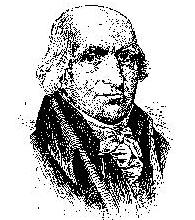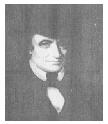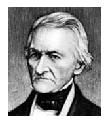Biographies - P through R
 PICKERING, Timothy, a Senator and a Representative from Massachusetts; born in Salem, Mass., July 17, 1745; attended the grammar school and graduated from Harvard College in 1763; clerk in the office of register of deeds in Salem; studied law; was admitted to the bar in 1768 and commenced practice in Salem; selectman and assessor 1772-1777; member of Committee on State of Rights of Colonists 1773; member of Committee of Correspondence and Safety 1774-1775; held various local offices; elected to the State legislature in 1776; entered the Revolutionary Army as colonel; appointed adjutant general and elected as a member of Board of War in 1777; became Quartermaster General of the Army in 1780; moved to Philadelphia in 1785 and to Wyoming County, Pa., in 1787; member of the Pennsylvania State constitutional convention 1789-1790; special government agent on missions to the Indians; appointed Postmaster General in the administration of President George Washington in 1791, as Secretary of War in 1795, and as Secretary of State 1795-1800; returned to Massachusetts in 1802; unsuccessful candidate for election in 1802 to the Eighth Congress; appointed chief justice of court of common pleas and general sessions of the peace in 1802; elected to the United States Senate as a Federalist in 1803 to fill the vacancy caused by the resignation of Dwight Foster; reelected and served from March 4, 1803, to March 3, 1811; unsuccessful candidate for reelection in 1811; censured by the Senate in 1811 for breach of confidence; member of the executive council of Massachusetts 1812-1813; elected as a Federalist to the Thirteenth and Fourteenth Congresses (March 4, 1813-March 3, 1817); declined to be a candidate for renomination; returned to his farm near Wenham, Mass.; returned to Salem in 1820; unsuccessful candidate for election to the Seventeenth Congress; died in Salem, Essex County, Mass., January 29, 1829; interment in Broad Street Cemetery.
PICKERING, Timothy, a Senator and a Representative from Massachusetts; born in Salem, Mass., July 17, 1745; attended the grammar school and graduated from Harvard College in 1763; clerk in the office of register of deeds in Salem; studied law; was admitted to the bar in 1768 and commenced practice in Salem; selectman and assessor 1772-1777; member of Committee on State of Rights of Colonists 1773; member of Committee of Correspondence and Safety 1774-1775; held various local offices; elected to the State legislature in 1776; entered the Revolutionary Army as colonel; appointed adjutant general and elected as a member of Board of War in 1777; became Quartermaster General of the Army in 1780; moved to Philadelphia in 1785 and to Wyoming County, Pa., in 1787; member of the Pennsylvania State constitutional convention 1789-1790; special government agent on missions to the Indians; appointed Postmaster General in the administration of President George Washington in 1791, as Secretary of War in 1795, and as Secretary of State 1795-1800; returned to Massachusetts in 1802; unsuccessful candidate for election in 1802 to the Eighth Congress; appointed chief justice of court of common pleas and general sessions of the peace in 1802; elected to the United States Senate as a Federalist in 1803 to fill the vacancy caused by the resignation of Dwight Foster; reelected and served from March 4, 1803, to March 3, 1811; unsuccessful candidate for reelection in 1811; censured by the Senate in 1811 for breach of confidence; member of the executive council of Massachusetts 1812-1813; elected as a Federalist to the Thirteenth and Fourteenth Congresses (March 4, 1813-March 3, 1817); declined to be a candidate for renomination; returned to his farm near Wenham, Mass.; returned to Salem in 1820; unsuccessful candidate for election to the Seventeenth Congress; died in Salem, Essex County, Mass., January 29, 1829; interment in Broad Street Cemetery.
![]()
 PLEASANTS,
James, a Representative and a Senator from Virginia; born at 'Cold Comfort,' in Powhatan County, Va., October 24, 1769; first cousin of Thomas Jefferson, pursued classical studies and graduated from the College of William and Mary, Williamsburg, Va.; studied law; was admitted to the bar and commenced practice in Amelia County in 1791; member, State house of delegates 1797-1802; clerk of the Virginia house of delegates 1803-1811; declined apponointment to the General Court June 24, 1809, and was elected Judge of the Supreme Court of Appeals of VA, January 30, 1811, but resigned February 23, 1811; elected as a Republican to the Twelfth and to the four succeeding Congresses and served from March 4, 1811, to December 14, 1819, when he resigned, having been elected a United States Senator December 10, 1819; chairman, Committee on Public Expenditures (Thirteenth Congress), Committee on Expenditures in the Department of the Navy (Fifteenth Congress); elected as a Republican to the United States Senate to fill the vacancy caused by the resignation of John W. Eppes and served from December 14, 1819, to December 15, 1822, when he resigned; chairman, Committee on Naval Affairs (Sixteenth and Seventeenth Congresses); Governor of Virginia 1822-1825; delegate to the State constitutional conventions in 1829 and 1830; retired and lived on his estate, 'Contention,' near Goochland, Goochland County, Va., where he died on November 9, 1836; interment on his estate.
PLEASANTS,
James, a Representative and a Senator from Virginia; born at 'Cold Comfort,' in Powhatan County, Va., October 24, 1769; first cousin of Thomas Jefferson, pursued classical studies and graduated from the College of William and Mary, Williamsburg, Va.; studied law; was admitted to the bar and commenced practice in Amelia County in 1791; member, State house of delegates 1797-1802; clerk of the Virginia house of delegates 1803-1811; declined apponointment to the General Court June 24, 1809, and was elected Judge of the Supreme Court of Appeals of VA, January 30, 1811, but resigned February 23, 1811; elected as a Republican to the Twelfth and to the four succeeding Congresses and served from March 4, 1811, to December 14, 1819, when he resigned, having been elected a United States Senator December 10, 1819; chairman, Committee on Public Expenditures (Thirteenth Congress), Committee on Expenditures in the Department of the Navy (Fifteenth Congress); elected as a Republican to the United States Senate to fill the vacancy caused by the resignation of John W. Eppes and served from December 14, 1819, to December 15, 1822, when he resigned; chairman, Committee on Naval Affairs (Sixteenth and Seventeenth Congresses); Governor of Virginia 1822-1825; delegate to the State constitutional conventions in 1829 and 1830; retired and lived on his estate, 'Contention,' near Goochland, Goochland County, Va., where he died on November 9, 1836; interment on his estate.
![]()
PRESTON, James Patton (1774-1853) Brother-in-law of John Floyd; uncle of James McDowell and John Buchanan Floyd; father of William Ballard Preston. Born June 21, 1774. Governor of Virginia, 1816-19. Died May 4, 1853. Burial location unknown.
![]()
PRESTON, William Ballard, (nephew of Francis Preston), a Representative from Virginia; born in Smithfield, Va., November 25, 1805; was graduated from the College of William and Mary, Williamsburg, Va., in 1823; studied law and was graduated from the University of Virginia at Charlottesville; was admitted to the bar and commenced practice in 1826; member of the State house of delegates 1830-1832; served in the State senate 1840-1844; again a member of the State house of delegates in 1844 and 1845; elected as a Whig to the Thirtieth Congress (March 4, 1847-March 3, 1849); appointed Secretary of the Navy in the Cabinet of President Taylor and served from March 8, 1849, to July 22, 1850; delegate to the State constitutional convention in 1861; served in the Confederate States Congress; died in Smithfield, Va., on November 16, 1862; interment in Preston Cemetery on the former Smithfield Plantation, Blacksburg, Va.
![]()
REED, Philip, a Senator and a Representative from Maryland; born near Chestertown, Kent County, Md., in 1760; completed preparatory studies; served in the Revolutionary Army, attaining the rank of captain of infantry; member, State house of delegates 1787; sheriff of Kent County 1791-1794; member of the executive council 1805-1806; elected as a Republican to the United States Senate in 1806 to fill the vacancy caused by the resignation of Robert Wright; reelected the same year and served from November 25, 1806, to March 3, 1813; lieutenant colonel of the Twenty-first Regiment, Maryland Militia, in the War of 1812 and lieutenant colonel commandant of the First Regiment, Maryland Militia, in 1814; elected to the Fifteenth Congress (March 4, 1817-March 3, 1819); unsuccessful candidate for reelection in 1818 to the Sixteenth Congress; successfully contested the election of Jeremiah Cosden to the Seventeenth Congress and served from March 19, 1822, to March 3, 1823; died in Huntingtown, Kent County, Md., November 2, 1829; interment in the cemetery of Christ Church, near Chestertown, Md.
![]()
 RITCHIE, Thomas (1778-1854), Printer to the Commonwealth of Virginia, edited the Richmond Enquirer from 1804 to 1845 and was one of the South's most-quoted Democratic Party spokesmen. The period from the 1830s to the 1850s was the high point of partisan journalism in the United States, and editors like Ritchie helped both state and national political leaders formulate their policies and sell those policies and candidates to the voters. An opponent during the 1820s of John Quincy Adams and Henry Clay and their plans to use the power of the national government to promote economic growth, Ritchie and many Democratic Party leaders in Virginia and in the South supported states' rights faction leaders such as Andrew Jackson. In 1845 former President Martin Van Buren asked Ritchie to move to Washington, D.C., to create a new national newspaper for the Democrats. Ritchie edited the Union until he retired in 1851, and was widely respected as one of the most influential Democrats in the United States.
RITCHIE, Thomas (1778-1854), Printer to the Commonwealth of Virginia, edited the Richmond Enquirer from 1804 to 1845 and was one of the South's most-quoted Democratic Party spokesmen. The period from the 1830s to the 1850s was the high point of partisan journalism in the United States, and editors like Ritchie helped both state and national political leaders formulate their policies and sell those policies and candidates to the voters. An opponent during the 1820s of John Quincy Adams and Henry Clay and their plans to use the power of the national government to promote economic growth, Ritchie and many Democratic Party leaders in Virginia and in the South supported states' rights faction leaders such as Andrew Jackson. In 1845 former President Martin Van Buren asked Ritchie to move to Washington, D.C., to create a new national newspaper for the Democrats. Ritchie edited the Union until he retired in 1851, and was widely respected as one of the most influential Democrats in the United States.
![]()
RIVES, William Cabell, a Representative and a Senator from Virginia; born at 'Union Hill,' Amherst County, Va., May 4, 1793; attended Hampden-Sidney College in Virginia and graduated from the College of William and Mary, Williamsburg, Va., in 1809; studied law under the direction of Thomas Jefferson, 1809-1811; was admitted to the bar about 1814 and commenced practice in Charlottesville, Albemarle County; aide-de-camp to Gen. John H. Cooke 1814-1815; delegate to the State constitutional convention in 1816; member, State house of delegates 1817-1820, 1822-1823; moved to 'Castle Hill,' Albemarle County, in 1821; elected to the Eighteenth and to the three succeeding Congresses and served from March 4, 1823, until his resignation in 1829; Minister to France 1829-1832; elected as a Jacksonian to the United States Senate to fill the vacancy caused by the resignation of Littleton W. Tazewell and served from December 10, 1832, to February 22, 1834, when he resigned; again elected to the United States Senate to fill the vacancy caused by the resignation of John Tyler and served from March 4, 1836, to March 3, 1839; chairman, Committee on Naval Affairs (Twenty-fourth and Twenty-fifth Congresses); subsequently reelected as a Whig on January 18, 1841, for the term beginning March 4, 1839, and served until March 3, 1845; chairman, Committee on Foreign Relations (Twenty-seventh Congress); again Minister to France 1849-1853; member of the peace convention of 1861 held in Washington, D.C., in an effort to devise means to prevent the impending war; delegate from Virginia to the Confederate Provisional Congress in Montgomery, Ala., and Richmond, Va., in 1861; member of the house of representatives from Virginia in the Second Confederate Congress. He was the author of: "The Life and Character of John Hampden', (1845); "Ethics of Christianity" (1855); "The Life and Times of James Madison" (3 vols. 1859-1869). He died on his plantation, 'Castle Hill,' near Charlottesville, Va., April 25, 1868; interment in the private burial ground on the family estate. [See Table of Participants]
![]()
ROANE, Spencer, Born in Essex County, Virginia on 4 April 1762. Graduate of The College of William and Mary. Admitted to the Virginia bar in 1782. Member of the Virginia House of Delegates (1783, 1784) and the Virginia State Senate (1788-1789); judge, Virginia General Court (1789) and Virginia Supreme Court of Appeals (1794-1821). He attended the College of William & Mary, studied law under George Wythe (1726-1806), and was admitted to the bar in 1782. The license, dated 31 October 1782, granted to Spencer Roane, permitting him to practice law in the county courts and other inferior courts in Virginia was signed by Governor Benjamin Harrison. Roane represented Essex County in the House of Delegates from 1783 to 1785, and represented Essex, King William, and King and Queen Counties in the Virginia State Senate from 1788 to 1789. Roane also served on the state privy council from 1784 to 1786. In 1789, he became a judge of the General Court of Virginia, and in 1795, became a judge on the Virginia Court of Appeals, where he served until his death. An advocate of states' rights and strict construction of the federal Constitution, Roane was a judicial opponent of United States Supreme Court Chief Justice John Marshall (1755-1835), Jeffersonian in his beliefs and decisions. Co-founder of the Richmond Enquirer with his nephew, Thomas Ritchie, who edited the Enquirer from 1804 to 1845. Roane's son William Henry Roane (1787-1845) served in the House of Delegates and in the United States Congress. Roane married Anne Henry (1767-1799), the daughter of Patrick Henry (1736-1799), 7 September 1786. After her death, he married Elizabeth Hoskins (1781-1825) of King and Queen County 19 March 1801. Roane died 4 September 1822 at Warm Springs, Bath County, Virginia.
|
This Internet Presentation is Copyright 13th-amendment.org
Documents presented on this site are the property of their respective authors as
credited.
Please contact them for reprint permissions. contact
[Project 13 Email] |